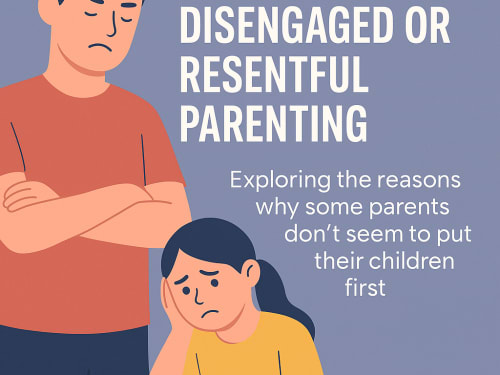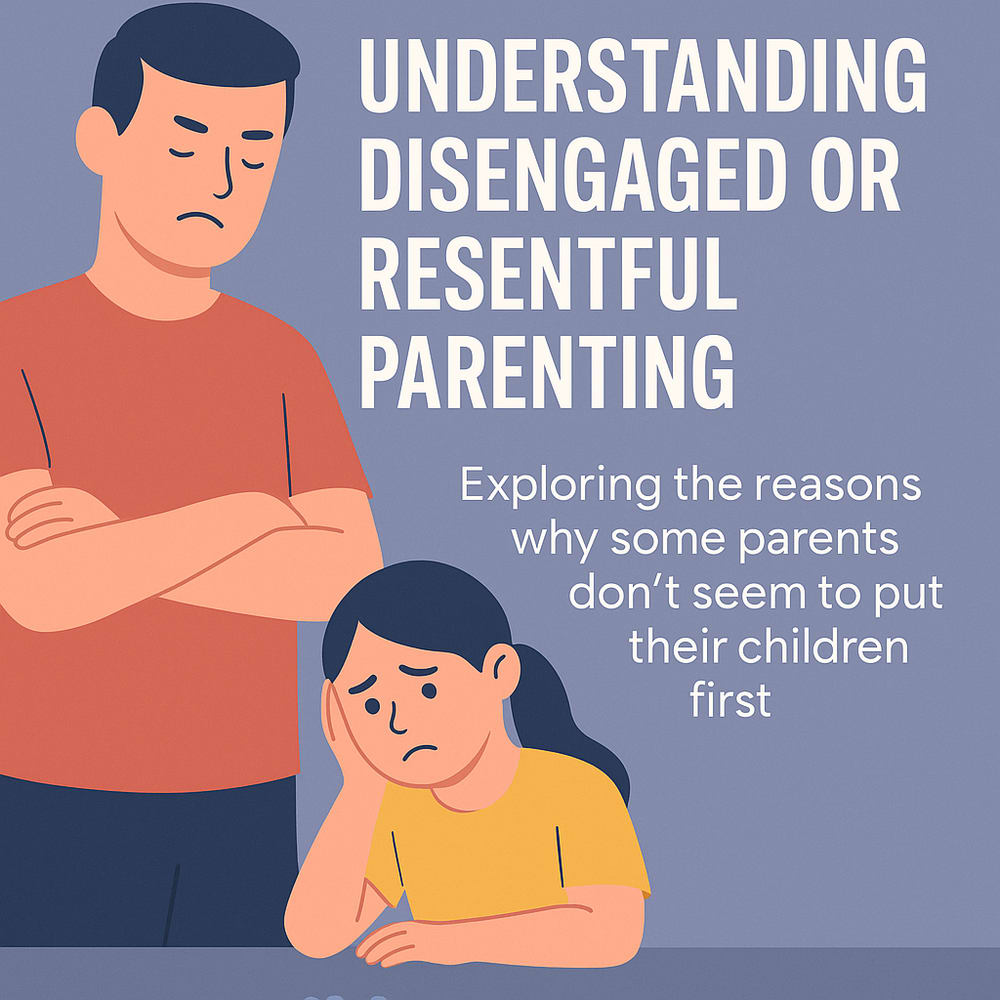Resentful Parenting

posted 5th August 2025

When Parents Struggle to Prioritise Their Children: Understanding the Psychology Behind Disengaged or Resentful Parenting
Parenting is often described as the most rewarding, yet challenging role a person can undertake. While many parents naturally nurture and protect their children, others appear emotionally distant, resentful, or even openly antagonistic towards their offspring. This behaviour can be baffling and distressing for both children and co-parents. But from a psychological standpoint, such patterns rarely arise in a vacuum—they are often shaped by deep-rooted personal histories, unresolved trauma, and systemic issues that extend beyond the individual.
Research in developmental psychology consistently highlights the influence of a parent's own childhood on their ability to nurture. Individuals who experienced abandonment, neglect, or emotional invalidation as children may develop insecure attachment styles that affect their capacity to bond with others—especially their own children.
For example, a parent who was never emotionally attuned to as a child may struggle to meet their own child’s emotional needs. In some cases, parenting may reawaken painful memories or unresolved issues, triggering resentment or withdrawal rather than empathy.
Attachment Theory, pioneered by John Bowlby and Mary Ainsworth, explains how early relationships with caregivers form the blueprint for future interpersonal relationships. Adults with unresolved attachment trauma may feel threatened by the intense emotional dependence of a child, perceiving it not as a bond, but as a burden.
Young Parenthood and Emotional Maturity
Having children at a young age can compound these issues. Adolescence and early adulthood are developmental periods where individuals are still forming their identity. When parenthood is introduced prematurely—before emotional regulation, identity formation, and coping skills are fully developed—it can lead to chronic overwhelm, poor emotional availability, and even resentment.
This isn’t to say that young parents cannot thrive, but rather that the psychological and emotional tools required to parent effectively may not yet be in place. The result can be a pattern where the parent unconsciously views the child as an obstacle to their freedom, ambitions, or unresolved emotional needs.
Personality Traits and Mental Health
Certain personality traits—such as narcissism, emotional immaturity, or low empathy—can also contribute to parenting struggles. Narcissistic parents, for instance, may view their child as a reflection of themselves rather than as an individual with their own needs. They may become angry or disengaged when a child requires more attention than they are willing to give, or when the child’s behaviour doesn’t align with their expectations.
In more severe cases, undiagnosed or untreated mental health conditions such as depression, borderline personality disorder, or PTSD can result in emotional detachment, irritability, or inconsistency in parenting. Parents suffering silently may be too preoccupied with their own emotional survival to tune into the needs of their children.
The Role of the Other Parent or Caregiver
When one parent appears to consistently place their own needs ahead of the child’s, the other parent plays a crucial protective role. This might include:
Providing emotional stability and predictability to the child, counterbalancing the inconsistency of the other parent.
Modelling healthy emotional regulation and attachment.
Seeking professional help, such as family therapy, to create a buffer and support the child’s wellbeing.
Setting boundaries where the child's welfare is being compromised.
It's important to avoid bad-mouthing the disengaged parent in front of the child, as this can create internal conflict and feelings of divided loyalty. Instead, support the child in developing their own perceptions, while validating their feelings.
Long-Term Impact on Children
Children who grow up feeling secondary to a parent’s needs often internalise damaging beliefs. They may feel unworthy, invisible, or inherently flawed. This can manifest in adulthood as:
- Difficulty forming secure relationships
- People-pleasing behaviours or emotional suppression
- Low self-esteem or chronic self-doubt
- Heightened risk of depression and anxiety
A study published in Child Abuse & Neglect (Norman et al., 2012) found that early emotional neglect has comparable long-term psychological effects to physical abuse. The wounds of feeling unwanted or emotionally unsupported can run deep, even if basic physical needs were met.
Can It Be Changed?
Yes. While these patterns can be deeply ingrained, they are not set in stone. Psychotherapy—particularly approaches like schema therapy, compassion-focused therapy, and CBT—can help struggling parents understand the origins of their behaviour and develop more constructive ways to connect with their children.
Support for the child is also essential. Early therapeutic intervention can help prevent the internalisation of negative self-beliefs and equip children with emotional resilience.
It’s easy to label disengaged or resentful parents as selfish. And sometimes, their behaviours do cause harm. But it’s important to understand the psychological roots of such patterns. Trauma, unprocessed grief, personality dynamics, and developmental immaturity can all contribute.
Rather than focusing solely on blame, a more productive approach is to focus on intervention, support, and recovery—both for the parents and the children affected.



